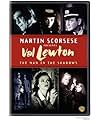Born in Yalta in the early 1900s to Russian parents, film producer Val Lewton was raised in America by his mother and sister, honing a colorful imagination even through his years at military school; he wrote articles and published a few pulpy stories before landing in Hollywood as protégé to David O. Selznick. Selznick turned out to be a helpful boss but was no father-figure, rarely if ever giving Lewton credit for the work he did on pictures such as "Anna Karenina" and "Gone With the Wind". A movie-producing offer eventually came from financially-strapped RKO, who hoped a series of low-budget thrillers would get them back in the black, and Val Lewton was on his way. This documentary on Lewton's career (produced in conjunction with Turner Classic Movies by Martin Scorsese, who also narrates) is nearly bereft of details on Lewton's personal life, mostly due to the fact no documents exist of his recorded voice. Photos and letters written by Lewton help to fill in the gaps, but we never get much sense of the reported turmoils and trouble Lewton went through while working in Hollywood. We also are not privy to much information that went on in the RKO offices with each new Lewton release, only that his films were "successful" up to and including 1946's "Bedlam". If all or most of his films were so popular, what accounted for Lewton's anxieties? He and his wife raised two children--a girl who is unaccounted for here, and a son who has grown up seemingly in the dark regarding his father's business affairs--but what happened to his supporters? Editor Mark Robson and director Robert Wise, themselves protégés of Val Lewton, later found success on their own but failed to extend an olive branch to Lewton once tastes in Hollywood changed. Yet, instead of acknowledging the fact that Lewton was out of step with the times, Robson and Wise are left looking like false friends. The special is clip-heavy, with a finely-tuned parallel atmosphere to compliment the array of sequences, yet it doesn't cut very deep. Still, if the central desire here was to create an interest in Val Lewton's productions for audiences unaware of his languid, elegiac and stylized mood pieces, then "The Man in the Shadows" certainly succeeds. It thoughtfully whets the appetite for an evening's worth of Lewton product, and the artful way in which he was able to combine good and evil with the most subtle of touches.











